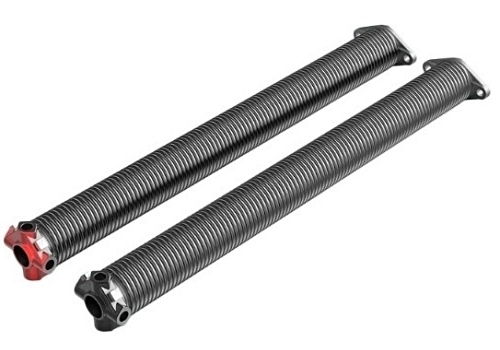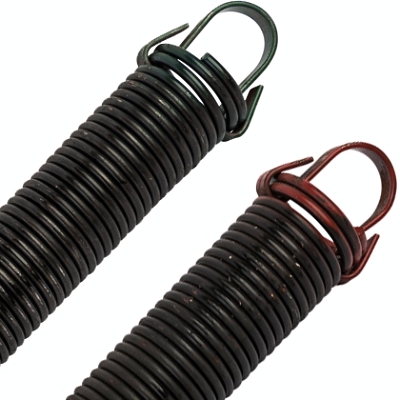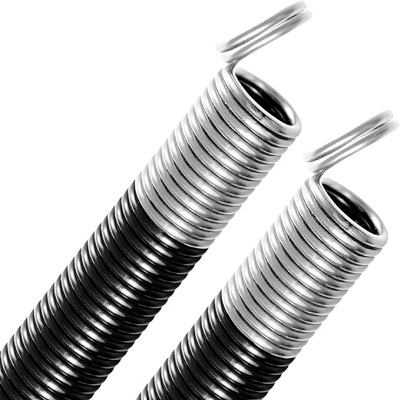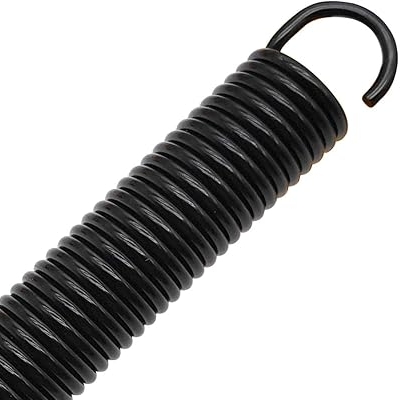Extension Garage Door Spring Guide
At C & M Garage Doors, we get it – most folks in Northern Colorado hardly notice their garage door until it misbehaves. Yet the unsung heroes of a smooth, safe lift are the springs. These heavy-duty components counterbalance the door’s weight so it can rise and lower with control. Below, we zoom in on one specific style – extension garage door springs – covering how they function, how they stack up against other spring systems, and what to consider if yours need service or replacement in Loveland, Greeley, or the wider region.
What Are Extension Springs?
Extension springs are long coils mounted along both sides of the door, typically parallel with the horizontal tracks. As the door moves, they lengthen and shorten in response. When the door is fully closed, the springs sit under tension; as it opens, that stored force is released and the contraction helps lift the door into place.
Extension springs • stretch and contract along the sides of your garage door to help lift and lower it. Extension springs work by stretching out as the door shuts and pulling it back up as it opens.
This is all about potential energy: the springs store force as the door lowers and give it back as the door rises. Because they operate under substantial tension, they’re commonly paired with safety cables that help contain the spring if it fails, reducing the risk of damage or injury.
Types of Extension Springs
Extension springs come in multiple configurations designed for different weights and duty cycles. Though they all extend and retract to help shoulder the door’s load, their end connections and construction influence strength, longevity, and the right fit for your specific door.
The most common residential options are open-looped, double-looped, and clipped-end springs – terms that refer to how the spring connects to adjoining hardware. Selecting correctly depends on the door’s weight, how often it’s used, and desired durability. C & M Garage Doors carefully checks these factors during installs and repairs to ensure the right match for homes in Loveland, Greeley, and across Northern Colorado.
| Type | End Style | Strength | Durability | Installation Complexity | Common Usage |
|---|---|---|---|---|---|
| Open-Looped | Single wire looped at the end | Low | Basic | Easy to install | Lightweight garage doors |
| Double-Looped | Two coils forming the end loop | Medium | Moderate | Moderate difficulty | Standard residential garage doors |
| Clipped-End | Metal clip fastened to the end | High | Most durable | Challenging to install | Heavy or high-cycle garage doors |
Open-looped styles are affordable and straightforward to swap, making them a sensible pick for lighter doors. Double-looped versions add strength for typical residential duty. Clipped-end springs provide the most robust connection and are ideal for heavier doors or higher daily use – common with large homes or small commercial applications in Northern Colorado.
If you’re not sure which springs you have – or which you need – C & M Garage Doors can inspect your setup and recommend an option that balances safety, performance, and cost.
Extension Springs vs. Torsion Springs
Residential doors typically rely on either extension or torsion systems to offset weight. Torsion springs sit horizontally above the opening, while extension springs run along the tracks on each side. Both aim to make lifting easier, but they do so in different ways and each brings distinct advantages depending on door size, layout, and how often you use your garage in Northern Colorado.

Extension designs stretch and retract; torsion systems spin on a shaft to apply torque. Some specialty doors combine the two for added support, but most homeowners in Loveland and Greeley will have one style or the other. C & M Garage Doors installs and services both, matching the solution to your door’s configuration and how you use it day to day.
| Attribute | Extension Springs | Torsion Springs |
|---|---|---|
| Location | Alongside horizontal tracks | Mounted above the door |
| Operation | Stretches and contracts | Twists to store torque |
| Cost | Lower initial cost | Higher upfront cost |
| Lifespan | 5,000-10,000 cycles | 15,000-20,000 cycles |
| Performance | More bounce and sway | Smoother, more controlled |
| Safety | Requires safety cables | Less likely to snap dangerously |
Both systems have a role. The team at C & M Garage Doors will evaluate your door style and usage patterns before recommending a path forward. While torsion setups generally deliver longer life and more refined motion, extension springs remain a budget-friendly, practical choice for many Northern Colorado homes.
Common Problems with Extension Springs
All mechanical parts wear out eventually. Extension springs can weaken, rust, or break over time – especially with Northern Colorado’s wide temperature swings. If the door feels heavy, tracks unevenly, or moves with a jerky motion, tired springs may be the culprit.
Other signs to watch for include:
- Springs that look stretched out or misshapen – Cracked or fractured hinges can’t support the panel joint, leading to misalignment, jerky travel, or even panel damage.
- Popping, banging, or other sharp noises when the door operates – Persistent loosening can indicate warped hardware or stripped screw holes. Left alone, the joint can spread and stress adjacent parts.
- Frayed or broken safety cables – Hinge pins and knuckles can dry out or corrode. A silicone-based lubricant may quiet healthy hinges; damaged ones typically require replacement.
Need New Extension Springs?
Our garage door repair experts offer extension spring replacements & all other essential garage door services in Northern Colorado. Visit the page below to learn more - or call our team to schedule local services!Avoid DIY fixes with high-tension components. Improper handling can cause serious injury. Our trained technicians have the proper tools and experience to service springs safely and correctly.
Safety Tips and Professional Maintenance
Because extension springs are under significant tension, safety matters. Confirm that safety cables run through the spring centers – these help contain hardware if a break occurs. If your system lacks cables, schedule an installation as soon as possible.
C & M Garage Doors is available for maintenance and tune-ups across Loveland, Greeley, and nearby communities. Consistent care improves safety and helps the entire system last longer.
Conclusion
They may not draw attention, but extension springs are vital to every open-and-close cycle. Knowing how they function, how they differ from torsion systems, and the warning signs of wear can help you avoid surprises and keep your door dependable for years.
C & M Garage Doors proudly serves homeowners throughout Northern Colorado with expert repair, installation, and maintenance. If you’re dealing with a broken spring or want to talk through your options, give us a call – we’re ready to help.



